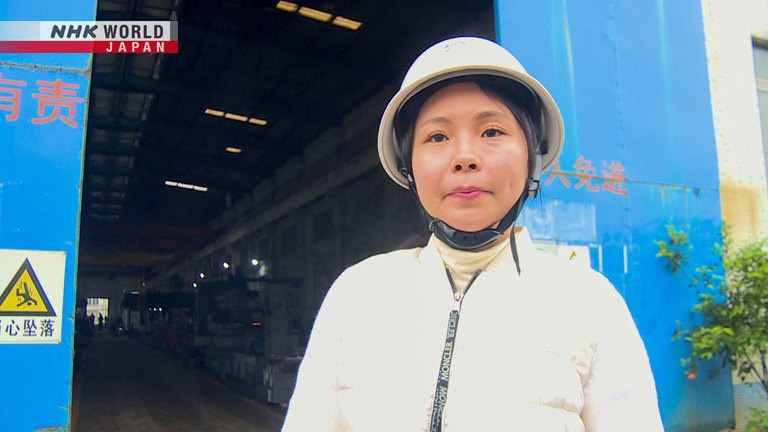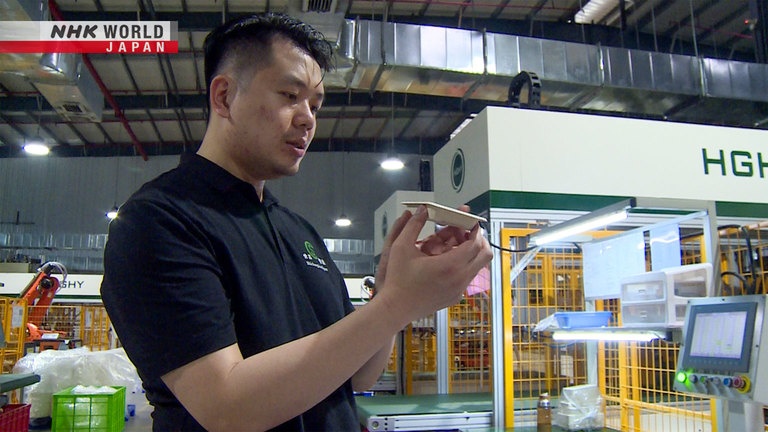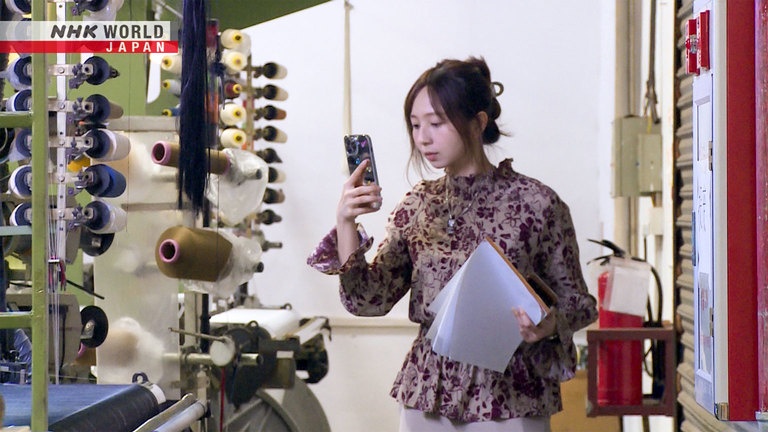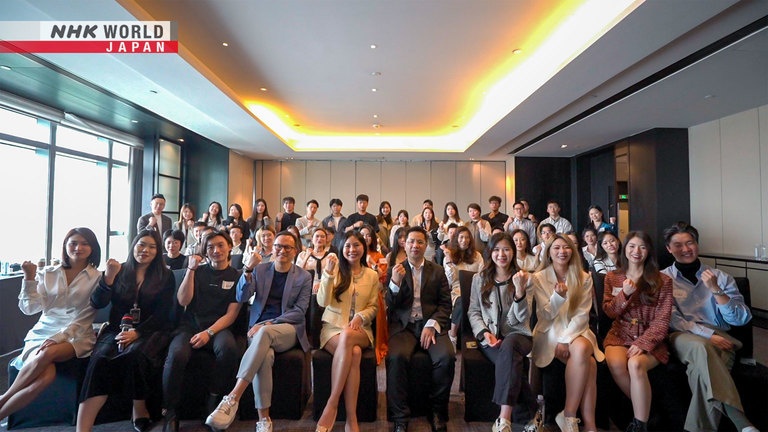The Uncertainty of China's "Factory Inheritors"
Chinese business founders who succeeded in manufacturing during the country's economic growth have reached retirement age. Now taking the helm from them are the "factory inheritors," their sons and daughters who have benefited from opportunities such as studying abroad. However, the conditions they face in China's manufacturing industry are far different than what they had studied, as they grapple with post-pandemic economic stagnancy that threatens to grow even worse. In this episode, we meet the young people who have inherited a battle for business survival.




Transcript
Guangzhou, in China's Guangdong Province.
At this high-end restaurant, a large number of young people have gathered.
All of them are the owners or CEOs of manufacturing companies.
Most have just taken the reins from a parent who founded the business.
In China, these youths are called "factory inheritors."
They've grown up wealthy, with many traveling abroad for their education.
To better exchange information they've even formed their own group on social media.
Factory Inheritors GO GO GO.
Despite this ambition, what has awaited them, after the removal of the Zero-COVID Policy,
is a stagnant manufacturing industry that has yet to recover.
Since the Chinese New Year, production
has halted for a couple weeks.
Now that the Zero-COVID Policy
has ended...
All of us need to figure out
how to make a living.
Together, they air their candid worries about the future of the Chinese economy,
and their feelings of pressure as new owners.
If we can't improve things,
many of us won't make it.
When my parents pass away,
I'd like to just sell the company.
I could travel the world.
Once known as the world's factory, China's manufacturing industry is in a state of flux.
In this episode, we meet the factory inheritors who struggle with what to make of this uncertain future.
Guangdong Province, in southern China.
Since the Open Door Policy in the 1980's, the region flourished as a center of manufacturing.
Huang Xiyi is an administrator of an online factory inheritors group.
She runs a plant in Foshan City.
- Was this returned for repair?
- No, it's set to be sold overseas.
With 800 workers, Huang's company is one of the most prominent machine equipment manufacturers in the country.
They deal primarily in machines that make equipment from sheet metal.
Their machines for building construction ducts command half the domestic market share,
while their shipping-container-making units account for 90% of numbers worldwide.
This machine makes construction ducts.
Our clients use this to make their own ducts.
However, after the Chinese New Year in 2023, the country experienced a nationwide downturn in real estate,
majorly impacting construction projects.
Huang's company was one of those seriously affected.
We all assumed that the economy would
improve after the Zero-COVID Policy.
This year turned out to be
the complete opposite.
I'd thought that the real estate market
would improve with the new year.
Who could have anticipated that duct
machines would go totally unneeded?
I noticed something strange early on
in the year.
Clients cancelled even after paying
advances. Sales plummeted.
As she struggles with each passing day, Huang can hardly conceal her anxiety toward the future of the business.
I was just desperate to preserve
the company and our livelihoods.
Now that the Zero-COVID Policy
has ended...
All of us need to figure out
how to make a living.
Huang was born in a downtown district of Guangzhou.
Here it is.
I used to play here as a child.
I was raised around here.
This is one of our locations.
We made our first factory here.
Huang's father, Huang Yinfeng, founded the family business.
It's been 42 years...
Not 43?
It was 1981. 42 this year.
At the time China embarked on its Open Door Policy, Yinfeng worked as a doctor.
He started out small, installing machining equipment in his home.
Buoyed by the wave of economic growth, the factory became profitable.
They grew into a major player in the industry handling machine design, production, sales, and maintenance.
Thanks to the income from the family business, Huang Xiyi was able to study abroad in America, after graduating middle school,
and obtained an MBA from Boston University.
She then traveled to France to study jewelry marketing.
Heeding her father's wishes as he neared retirement,
Huang returned to China in 2019, and took over operation of the business.
With that, she joined the ranks of the factory inheritors.
Once she immersed herself in the production, management and sales of machines,
she realized how different it was from what she'd studied overseas.
I wasn't actually interested in
the family business.
But I thought I should carry it on.
I felt a sense of responsibility and dedication.
If I didn't see it through, the business built
by my father was likely to vanish.
The weight of unfamiliar duties on Huang's shoulders caused her considerable stress.
During the Chinese New Year, she aired her feelings of concern on social media.
"Business management is so hard,
I'm under constant stress."
The post gathered sympathy from many other young business owners, who expressed similar responses.
In a short amount of time, she received hundreds of responses.
They started a chat group called "Factory Inheritors GO GO GO."
In just two months, the number of members neared 3,000.
Lao Junjie is one of the members who takes part in the group.
He studied business management at the University of San Francisco.
After graduating in 2019, he moved to Taishan City to take over his father's factory.
- What's this building?
- The warehouse of our factory.
Lao's company collects used paper to recycle into cardboard boxes, for a variety of products.
They boast yearly sales of 130 million US dollars, with 500 workers.
The company ranks in the top 3 cardboard companies of Guangdong Province.
Even during the Zero-COVID Policy, due to the importance of internet sales, demand for cardboard products remained mostly steady.
This spring, however, their fortunes turned.
Production has stopped?
That's right.
For how long?
Since the Chinese New Year, production
has halted for a couple weeks.
Most of our orders are boxes for products.
Customers are reluctant to spend money,
and consumption has declined.
If this keeps up, our situation won't improve.
With the downturn in orders, Lao had no choice but to partially suspend production.
I don't have the experience necessary
to turn the tide.
I can only wait for the economy
to improve.
Zhang Jiaen is another member of the Factory Inheritors chat group.
She runs a factory in Dongguan City that makes tags for apparel products.
These are our main products,
clothing tags.
After graduating in 2018 from the University of Queensland in Australia,
Zhang returned to China to take the helm of her father's company.
She'd looked forward to economic recovery once the pandemic ended, but she was instead met with unexpected difficulties.
Our sales are poor this year.
We're usually busy after the
Chinese New Year.
We'd needed to employ seasonal workers
to cover all the orders.
But this year, the busy season never came.
In order to drum up orders, she'd made an effort in exporting product overseas,
but the steadily increasing personnel costs proved an obstacle.
How much have personnel costs increased?
They've gotten 10 times higher
in the last 20 years.
How much are worker's salaries?
It depends on the type of work,
but between US$ 1,000 and 1,400.
International buyers have more choices now.
It isn't just China they're dealing with.
There are cheaper factories elsewhere
in southeast Asia.
The factory inheritors also have another thing to deal with: pressure from the founders of the companies, their parents.
Every Sunday, machinery manufacturer Huang has dim sum with her parents and grandparents.
Here's hoping for good fortune.
The shell is chocolate.
Very tasty.
Her father Yinfeng made his way in the era when China was hailed as the world's factory.
Now, rapidly shifting international factors have given him a sense of trepidation.
He's more than a little worried about what awaits his daughter, who has just gotten her feet wet.
I think the economic slump stems from
both domestic and foreign policy.
Although the pandemic has ended,
China has been split off from the West.
The world has been divided even more
by the conflict between Russia and Ukraine.
Western nations made a conscious effort
not to rely on Chinese products.
What will happen to Chinese manufacturing?
Do you think it'll be thinned out?
Aside from those with special techniques,
many are likely to go bankrupt.
We live in an online era.
I think that our company needs to evolve.
Later, Huang pays a visit to another member of the factory inheritors group.
She's meeting with cardboard factory owner Lao Junjie.
Nice to meet you.
While waiting for the economy to improve,
Lao invited a well-known business specialist from Hong Kong to give an online seminar.
Knowing Huang from the group, he encouraged her to join them.
The man advising them is the former vice-president of a chemical manufacturer and current visiting professor, Ben Poon.
Poon's guidance gets to the heart of the obstacles faced by the factory inheritors.
Many countries now have lower
labor cost than China.
We aren't able to win work based on
pricing anymore.
The "heavenly time, earthly advantage,
and man's harmony" of our growth are no more.
Factory inheritors need to
come to terms with this reality.
Your greatest weapon is the time
you spent studying overseas.
You're able to flexibly adapt and
take on ambitious challenges.
But your abilities to accomplish things
aren't there yet.
Lack of experience and
connections is a weakness.
I'd estimate that between 70% and 80%
of factory inheritors fail.
In order to ensure her company's survival, Huang is pursuing a new kind of business.
In 2019, she invested 700,000 dollars to form a subsidiary.
Their work is in IoT, the Internet of Things.
They developed a smartphone app that lets users operate machines remotely.
Our machines were operated manually,
but with this they can be automated.
You upload the designs with a smartphone.
Then, automatic production begins
with the push of a single button.
This lets engineers operate machines
remotely without being on site.
However, the subsidiary's finances still remain in the red, requiring several infusions of funding.
Their total investment has now exceeded 4 million dollars.
The vice president of the subsidiary has recently asked Huang's parent company for an additional investment.
Monthly costs are $22,000 for personnel.
$11,000 for operations.
Our joint project with the Fujian provincial
government is about to start.
We've relied on these infusions so far.
I understand the pressure you're under.
We've spent a lot on the venture
up to this point.
How much more do you need?
$110,000?
If we increase the investment, what kind
of results can we expect?
We can't just be bailing you out.
You ought to at least cover
your own personnel costs.
It's been 4 years since the subsidiary
was established.
The fact that it still can't cover costs
remains as a glaring problem.
I know things were hard for the parent
company in the pandemic.
Don't change the subject.
That isn't the issue.
It's whether you can make money.
The money we invest was
built up bit by bit.
You should do the same.
If you can't earn, you don't deserve
to run a business.
Late June.
At a restaurant in Guangzhou, the members of the factory inheritors chat group are holding a dinner gathering.
I had to wear this dress in the factory.
I felt a little embarrassed pairing it
with the safety helmet.
Let's toast.
It's so nice to meet you all.
To Huang, gathering with those in a similar situation is an incredible relief.
Unlike at the factory, I have fun with you
all and can let off some stress.
Running the factory is a drag.
If we'd started our businesses, even if we
failed, our parents would keep quiet.
But inheriting it from them carries the duty
of protecting the family business.
Otherwise, we look incompetent.
Success is taken for granted.
We're a large company, so it's an awkward
situation, whether I lead or not.
-Large companies go down every day.
-Like the Evergrande Group.
It isn't the successor's fault.
There's so much out of our hands.
Political problems and government policies.
We can't control those.
We can only do as much as we can.
Just what we can.
If our efforts aren't enough,
then we're bound to fail.
Bankruptcy is a consideration.
When my parents pass away,
I'd like to just sell the company.
I could travel the world.
Apparel tag manufacturer Zhang continues her own efforts.
She's implemented AI-based inspection software to reduce personnel cost.
We had workers checking each product
to make sure it matched the design.
But with human error, we often
overlooked defective items.
That's why we developed this software.
She also began using a video streaming site that's popular with young users.
Learning how to film and edit on her own, she began internet-based promotion and sales.
I input the footage I took into
editing software.
It outputs the video right away.
These short videos for promotion are
10 to 15 seconds each.
I've intentionally used technical wording
to appeal only to industry professionals.
The results of her efforts are apparent.
"I'd like to try them out.
Could you send a sample?"
"- I want to make a purchase.
Do you have a store?"
"- How much are they?"
It lets us connect with the right people.
I think that if 100 people see our video,
they might share it with their friends.
It's a low-cost and efficient
promotional tool.
In July, Lao's partially suspended cardboard production gets back into action.
After the pandemic, he noticed that the food and beverage industry recovered relatively quickly.
He decided to focus on products needed by restaurants.
This is one of our new products,
a serving tray made from paper.
It can be customized accordingly.
This one is for serving sushi.
Although sales levels haven't yet recovered to pre-pandemic heights,
Lao gradually feels a sense of hope.
Sales for electronics, cosmetics, and
automobiles show no sign of recovery.
The Chinese economy may take even
longer to truly recover.
China's manufacturing industry functioned as the "world's factory" over more than 20 years of growth.
Bearing the responsibility for its future,
the factory inheritors now attempt to engineer their own devices for survival.